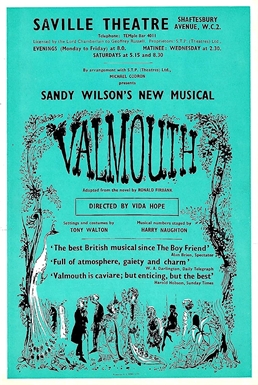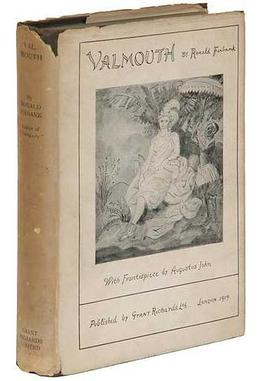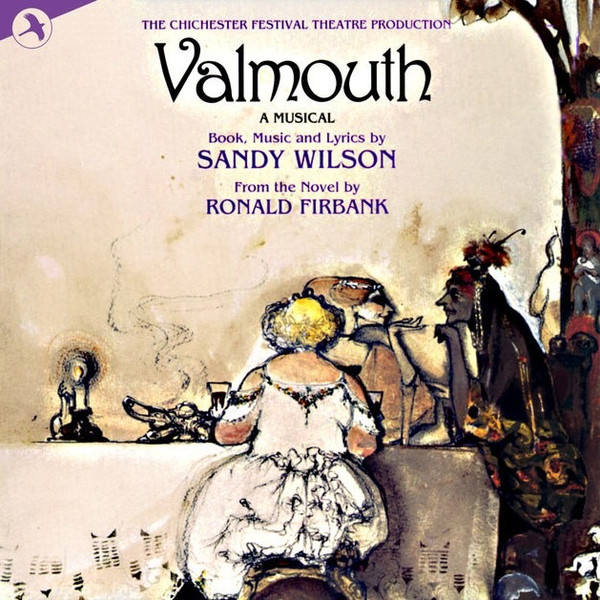Kurt Gänzl
The Encyclopedia of the Musical Theatre
28 August, 2022
The show was commissioned from Sandy Wilson, the author-composer of The Boy Friend, by Oscar Lewenstein and the Royal Court Theatre as a vehicle for American actress and vocalist Bertice Reading. However, the musical Valmouth was ultimately not produced by the English Stage Company, but by the young Michael Codron.

Flyer of the original 1959 production of “Valmouth” at the Saville Theatre. (Photo: Wiki Commons)
Miss Reading starred as the ambivalent and outrageous “negro masseuse” of Ronald Firbank’s Valmouth at the centre of a libretto crafted with great skill from the somewhat diffuse elements of the novelist quirky and esoteric universe. The 1919 novel was noted for its “florid and baroque style” and parody-like humor, as well as for its “sexual innuendos”, both heterosexual and homosexual.

Ronald Firbank’s novel “Valmouth” from 1919. (Photo: Wiki Commons)
The musical version premiered at the Lyric Theatre, Hammersmith, on 2 October 1958; it then moved to the Saville Theatre, London, on 27 January 1959.
Arcane Mysteries
At the English spa town of Valmouth we meet the eccentrically papist and centenarian lady of the manor, Mrs Hurstpierpoint (Barbara Couper), the unquenchably lustful and equally aged Lady Parvula Panzoust (Fenella Fielding), the plebeian 120-year-old Granny Tooke (Doris Hare), and Mrs Thoroughfare (Betty Hardy) whose seafaring son, Captain Dick (Alan Edwards), provokes the events of the evening by abandoning his bosom pal, Lieutenant Whorwood (Aubrey Woods), for the charms of the dusky Niri-Esther (Maxine Daniels).
Nemesis falls on the arcane mysteries of Valmouth when the defrocked and debauched Cardinal Pirelli (Geoffrey Dunn) is summoned to celebrate the young pair’s nuptials and from the ensuing cataclysm only Mrs Yaj, Niri-Esther and her now illegitimate baby escape.
Wilson, having arranged these recondite folk into a shapely story, equipped them with some suitably special songs, which were eased into more natural English than Firbank’s greenly jewelled prose. Lady Parvula sighed brazenly over the thighs of a teenaged shepherd (who had just been naïvely querying ‘What Do I Want With Love?’), preparing to leap into the hay ‘Just Once More’, and apostrophized her late husband’s shade apologetically with a history of her indiscretions (‘Only a Passing Phase’), an incidental nun (Marcia Ashton) under a vow of silence for 364 days of the year burst forth with a veritable ejaculation of ecstatic chatter on ‘My Talking Day’, the Cardinal described the joys of ‘The Cathedral of Clemenza’, the two sailors sang (with rather different feelings) of ‘Niri-Esther’ and the three old beldames looked back in creaking harmony to their far-off youth when ‘All the Girls Were Pretty (and all the men were strong)’.
Mrs Yaj’s songs glittered just a little less than these, but her bouncy ‘Big Best Shoes’ proved the show’s easier-to-eat take-away number.
On its production in Hammersmith, Valmouth, not unexpectedly, drew some outraged reviews and customers and some which and who were simply thrilled.
Transfers to the West End and New York
A West End transfer was delayed and, as a result, when Valmouth opened at the Saville Theatre, Cleo Laine deputized for the otherwise engaged Miss Reading. The show got a similarly bipartite reception, but even the enthusiasm of its fans could not win it more than 102 West End performances to add to the 84 clocked up in Hammersmith.
Gene Andrewski mounted the show at New York’s York Playhouse the following year with Miss Reading starred alongside Anne Francine (Hurstpierpoint), Constance Carpenter (Parvula) and Alfred Toigo (Dick) but there the show died away in just 14 performances.

The 1980s recording of “Valmouth”. (Photo: TER)
For many years after, Valmouth remained remembered by connoisseurs of its generation as a “lost masterpiece” of the musical theatre, and the next generation were given their opportunity to agree when the Chichester Festival mounted a revival of the show in 1982.
Misses Reading, Fielding, Ashton and Hare repeated their original rôles alongside Judy Campbell (Hurstpierpoint), Jane Wenham (Thoroughfare), Mark Wynter (Dick) and Sir Robert Helpmann (Cardinal) in a memorable production by John Dexter which started all the discussions over again. The show’s evident minority appeal, however, meant that it did not transfer from its festival location to the commercial theatre of London.

A 2021 book on Sandy Wilson, London theatre and gay culture. (Photo: Methuen Drama)
